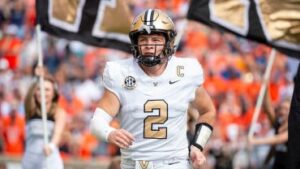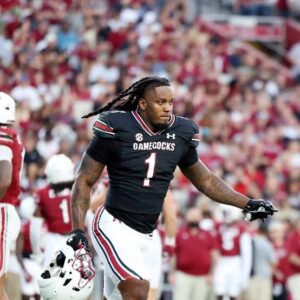With just days remaining before South Carolina’s season opener on August 31, running back Rahsul Faison remains caught in NCAA limbo. His case, now entering its eighth month without resolution, has become one of the most-watched eligibility dramas in college football this year.


And if the situation feels familiar it should. Just a year ago, Vanderbilt quarterback Diego Pavia was in a nearly identical fight. The outcome of that battle reshaped the NCAA’s stance on JUCO eligibility, sparked legal precedent, and earned Pavia a final season on the field.
So what does that mean for Faison? Let’s break it down.
A Twisting Path to Power Five Football
Rahsul Faison hasn’t had a traditional college football journey. After grayshirting at Marshall in 2019, he bounced between schools and circumstances:
Online coursework at Lackawanna College (2020)
A year at Snow College without seeing the field (2021)
A breakout JUCO season in 2022
A stellar 2024 campaign at Utah State, where he ran for 1,109 yards and 8 touchdowns
Now at South Carolina, Faison is seeking a seventh year of eligibility, arguing that his JUCO years—especially those in which he didn’t play—shouldn’t count against the NCAA’s five-year participation window.
His waiver request was submitted in January 2025, and despite legal counsel, media attention, and full participation in team activities, he’s still waiting for a ruling.
Déjà Vu: The Diego Pavia Case
If Faison’s argument sounds familiar, it’s because Diego Pavia made the same one—and won.
Pavia, a former JUCO standout turned New Mexico State quarterback, transferred to Vanderbilt for what he believed would be his final collegiate season in 2025. The NCAA, however, ruled he was ineligible due to JUCO years counting toward the five-year eligibility window.
Instead of waiting, Pavia sued the NCAA in federal court, claiming that the policy violated antitrust laws and unfairly restricted his ability to profit from NIL deals. In December 2024, a judge agreed, granting a preliminary injunction that allowed Pavia to play.
The fallout? The NCAA quickly issued a blanket waiver for similarly situated players—JUCO transfers with disrupted eligibility paths. It was a huge win for athlete rights and a pivotal moment in the evolving college football landscape.
Faison and the “Pavia Rule”
Faison’s legal team, led by prominent NIL attorney Darren Heitner, is now essentially asking the NCAA to apply the Pavia precedent.
So far, no lawsuit has been filed—but the pressure is mounting. Faison’s eligibility hinges on the NCAA applying the same logic it did for Pavia: that junior college years, especially non-playing ones, should not disqualify athletes from using their final year of eligibility.
South Carolina has built its fall camp with Faison involved, treating him as a presumed starter. But with no green light from Indianapolis, the Gamecocks are hedging their bets—prepping depth players like Oscar Adaway III and Matthew Fuller to step up if needed.
What’s at Stake
This isn’t just about one running back.
If the NCAA denies Faison or continues to delay its decision, it raises questions about fairness and consistency. Why would Pavia get relief, but not Faison? And what’s the point of a “blanket waiver” if it’s not being applied uniformly?
Legal action is still on the table. And given Pavia’s success, there’s reason to believe Faison could follow the same path—with the added benefit of precedent already on his side.
Will the NCAA Act—Or Force Another Court Battle?
With kickoff fast approaching, the NCAA is once again at a crossroads. It can:
1. Clear Faison now, citing the Pavia ruling as precedent.
2. Remain silent, risking another public relations and legal storm.
3. Deny the waiver, inviting another lawsuit that could further erode the NCAA’s legal standing on eligibility decisions.
None of these options are easy, but one is clearly the most fair—especially for a player who’s done everything by the book.
Final Thoughts
Diego Pavia fought the NCAA and won—not just for himself, but for players like Rahsul Faison. Now, the spotlight is back on the NCAA to see if it will stand by the precedent it was forced to accept.
Until then, Faison waits. So do his teammates, coaches, and fans. And just like last year, the entire college football world is watching.

